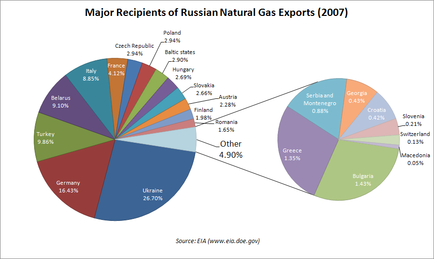Natural Gas in the Russia
Russia is believed to hold the largest reserves of natural gas in the world. It ranks as the second biggest producer on the global stage, with an output of nearly 670 million cubic meters (as of 2013), second only to the United States with its production of some 681 million cubic meters. As one of the most significant energy producers in the world and in its geographical region in particular, Russia’s supply of natural gas plays an important role the context of its standing in the EurAsian region, affording it crucial influence in relation to its foreign affairs policies. Moreover, the role of gas in its domestic economy cannot be understated.
Role of Natural Gas in the Economy

Along with oil, sales of natural gas constitute 50% of the total revenues for the Russian Federal government. Russia-based Gazprom is considered the world’s largest single extractor of natural gas. While the firm trades as a privately owned, open joint-stock company, Gazprom is considered to be closely related to the government as it holds a majority of the shares. There are a number of smaller companies operating natural gas extraction and production operations, but Gazprom is responsible for 94% of Russian production, and 17% globally. Gazprom is also an important asset for the economy, having contributed 8% of the gross domestic product for 2011.
Sources of Natural Gas and Export Markets
Russia is an energy rich country, and has many areas that are cited as being important sources for its production. Siberia has traditionally played a major role in this field, as well as the Baltic and Barents Sea. New gas fields which are believed to hold massive potential include areas of the Yamal Peninsula and the Arctic Shelf. Russia primarily exports its gas to the European Union and the Commonwealth of Independent States, which includes many of the republics that emerged in the post-Soviet era. There are also significant exports to Turkey through the Blue Stream Pipeline, which travels under the Black Sea and directly links the two countries. Additional pipelines are used to transport the gas to its neighbors and into Western Europe, in cooperation with participating local governments and companies.
The Role of Natural Gas in Russian Foreign Policy
Natural gas can be considered a strategic resource by Russia’s government. Russia is believed to have an estimated 1688 trillion cubic feet of natural gas reserves of within its territorial control. As the nation with the largest reserves on the global stage, the energy source plays a significant role in Russia’s foreign relations. Economic security and ability to use the sale of natural gas as a bargaining chip has shown itself to be increasingly evident in the context of its dealings within Europe. As Europe imports much of its natural gas for home heating, industrial use, generating electricity, and other purposes from Russia, the issue of conditions for these contracts is a constant concern for policy makers. In particular, Russia’s subsidized sales of natural gas to neighboring countries such as Ukraine, as well as the future of deals with some of the larger European Union powers such as Germany, have come into focus in recent years.